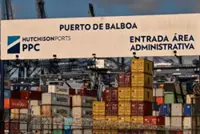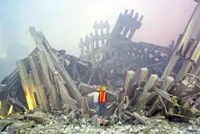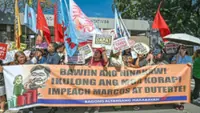Former US president Donald Trump being shot at and grazed by the bullet on July 13 shook the Americans. About a week later, President Joe Biden said he was stepping aside as the presidential candidate of the Democratic Party. — AFP
POLITICAL violence and unprecedented upheavals are taking place around the world, and the level of anxiety is also being raised.
Former US president Donald Trump being shot at and grazed by the bullet on July 13 shook the Americans. About a week later, President Joe Biden said he was stepping aside as the presidential candidate of the Democratic Party.
In May, Prime Minister of Slovakia Roberto Pizzo was shot and almost killed by a gunman. In June, Danish Prime Minister Mette Frederiksen was attacked by an unidentified man while walking through a square.
In Germany, ministers and lawmakers were attacked and injured by assailants one after another.
Two years ago in Japan then prime minister Shinzo Abe was shot and killed by a gunman during a campaign rally. Violence also occurred in South Korea during the recent primary race for the ruling People’s Power Party.
The violence and disruptions took place in various forms in different parts of the world, but they have one thing in common: They are the result of polarisation that has reached extreme levels.
As Trump is known to have led the polarisation of the United States, it is ironic that he almost fell victim to political terrorism. Biden’s decision is also related to polarisation – or rather to prevent the polarising Trump from being elected in November.
The incidents in Slovakia, Denmark, and Japan can also be seen as crimes to resolve dissatisfaction with government policies in an extreme way. In the case of South Korea, violence occurred as the primary to elect the ruling party leader overheated. This shows that South Korea is also not an exception to the effects of polarisation.
The problem is that polarisation is a phenomenon and not a cause of the violence. If we want to eliminate political terrorism, it is necessary to find out the cause of it. A prescription for solving the problem can be made only when the cause is known.
What is the reason, then?
We need to note that the end of the Cold War in 1991 changed many things, including the world order. The 9/11 terrorist attacks on the United States in 2001 was committed by a group of extremists angry at the country’s foreign policies.
The major problem with the policies was globalisation, which is based on neoliberalism. Though globalisation is a device that has spread the leadership of the US worldwide, it has also increased the voices in opposition to it. It is causing polarisation in many parts of the world, including the US.
Neoliberalism is the link between globalisation and polarisation. Since the end of the Cold War, the US has adopted neoliberal guidelines and pursued globalisation to promote the freest movement of capital, goods, and labour on a global level. However, globalisation has created market disruptions.
In the case of the US, imports of low-priced products from other nations, including China, put American companies and workers in trouble. It has become common for the white working class to fail to even get temporary jobs, such as workers at large retailers, due to the influx of cheap labour from Central or South America.
With the influx of illegal immigrants, major European countries have also experienced social conflicts between those who prefer moderate policies and those who prefer hardline policies to deal with refugees.
Neoliberalism tends to emphasise economic factors and freedom of expression, an element of liberal democracy, to the fullest extent. As a result, it also destroys the practice of “political correctness”, a speech courtesy that considers social minorities, and of “diplomatic prudence”, self-restraint so as not to provoke other countries or political forces unnecessarily.
Politics, which excludes consideration and moderation in a situation where social dissatisfaction and anxiety are swollen, has settled into a monstrous game that divides voters in half and incites voters’ dissatisfaction and anger with an extreme hatred for the other side.
Under the US-led world order, the possibility of war between countries was dramatically reduced. The war between Russia and Ukraine is indeed ongoing, but it is different from the typical war in that it is a rebellious act of Russia against the US-led order. This decrease in the likelihood of war is also a factor that intensifies polarisation.
Emphasising partisan interests rather than national interests to persuade voters has created a much more favourable situation in preserving the interest structure of politicians.
We can find ways to reduce political terrorism if it has been confirmed that the cause of it is polarisation and that neoliberalism and globalisation are the causes of polarisation. For sustainable neoliberalism, we need to review introducing regulations on the global flow of capital, goods, and labour. This part is already proceeding in the name of “economic security”.
Neoliberalism can be seen as undergoing self-purification as a form of capitalism. For the better future of globalisation, efforts must be made to consider and respect the characteristics of each region.
It is necessary to keep political correctness and diplomatic prudence in place, and to maximise education programmes that teach those values to the top leaders of major countries through continuous and active efforts of intellectuals. – The Korea Herald/Asia News Network
Wang Son-taek is an adjunct professor at Sogang University, South Korea.





